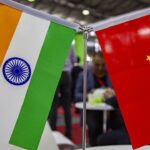US statements on affairs related to China’s Taiwan island have gone astray, out of tune and backward in the past 40 years, deviating from the consensus reached between China and the US when establishing diplomatic relations, the Chinese Foreign Ministry said on Monday, in response to US Secretary of State Antony Blinken’s false comments on Taiwan question.
“The so-called Taiwan Relations Act and the Six Assurances to Taiwan were concocted by some domestic forces in the US, which run counter to the three China-US joint communiqués,” Chinese Foreign Ministry spokesperson Zhao Lijian warned on Monday. “They have put US domestic laws above the international obligations, and are illegal and invalid.”
The comments came after Blinken’s false comments on the Taiwan question, claiming that the US has made commitments to “ensure Taiwan can defend itself.”
“What the US should abide by is the one-China principle and the three China-US joint communiqués, which are important political consensus between the two countries and the political foundation of China-US relations,” Zhao said.
Zhao noted that the secessionist Democratic Progressive Party (DPP) authorities in Taiwan have been colluding with foreign forces, which is the root cause of tensions in the Taiwan Straits.
“The national reunification is an unstoppable historical trend,” Zhao stressed. “The US should handle the Taiwan question carefully and appropriately so as not to damage China-US relations and the peace and stability across the Taiwan Straits.”
On Saturday, Chinese State Councilor and Foreign Minister Wang Yi spoke with Blinken, and warned the US not to support Taiwan secessionists.
In the widely-anticipated Xi-Biden meeting, Chinese President Xi Jinping will have a frank and in-depth exchange of views with US President Joe Biden on strategic issues concerning the future of China-US relations and important issues of mutual concern, said Zhao.
As the Taiwan question is expected to top the Xi-Biden meeting, it is also expected to focus on how to define the China-US relationship as it is important for the two countries to compete on the basis of common rules, experts said, noting that the two leaders are likely to discuss other issues such as trade, climate change and regional security, as well as stability in places like the South China Sea.
The meeting will serve as an indication of the future development of China-US relations, observers noted.
Global Times


